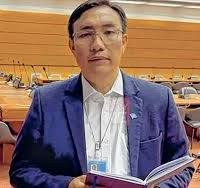Breakthrough likely in fresh row brewing in Manipur as Centre meets key outfit

A potential breakthrough is emerging in Manipur, where ethnic tensions have simmered for nearly two years. The Central government met with the Coordinating Committee on Manipur Integrity (COCOMI) on May 27 to discuss growing unrest. This fresh wave of discontent was triggered by a controversial move involving the removal of the word “Manipur” from a bus sign, which many viewed as an insult to Meitei identity.
The incident occurred during the Shirui Lily Festival in Ukhrul. A bus carrying journalists to the event had its “Manipur” signage erased. This action sparked outrage among the Meitei community in the valley, reigniting long-standing tensions with the hill-based Kuki-Zo tribes.
Protests and Rapid Mobilization by COCOMI
COCOMI responded swiftly to the controversy. Protests erupted across Imphal, with demonstrators blocking roads and demanding immediate action. The unrest became so intense that Governor Ajay Kumar Bhalla had to travel by helicopter to reach Raj Bhavan.
The group called for a 48-hour strike and immediately sought a meeting with Union Home Ministry officials in Delhi. During the discussion, COCOMI raised several urgent demands. These included restoring free movement within Manipur, locating missing persons, resettling displaced families, protecting cultural sites, and providing financial aid to affected farmers.
Constructive Dialogue Offers New Hope
According to sources, the meeting with the Ministry of Home Affairs was productive. Officials assured COCOMI of their commitment to address these demands. Although no immediate decisions were made, the positive tone of the conversation marked a shift from earlier deadlocks.
This renewed engagement comes after years of ethnic clashes. The violence began in May 2023 when the Meitei community requested Scheduled Tribe status. The move drew fierce opposition from the Kuki-Zo groups. The conflict escalated quickly, displacing thousands and claiming more than 200 lives.
Earlier Peace Efforts Show Mixed Results
The Centre has attempted peace talks in the past but with limited success. Earlier this year, a high-level meeting was held in Delhi on April 5. Representatives from both the Meitei and Kuki-Zo communities attended. While progress was slow, the event opened the door for continued dialogue.
Meanwhile, civil society groups took their own steps toward reconciliation. The Meitei Alliance and Thadou Inpi Manipur met independently to discuss peace. This grassroots initiative received praise from observers, who noted that local engagement often succeeds where top-down politics fail.
Tribal Leaders Hold Firm on Key Demands
Challenges remain. The Kuki-Zo community continues to demand a separate administrative region. The Centre has resisted this request, fearing it might set a dangerous precedent for other parts of India. Talks in Churachandpur earlier this month ended without resolution, as both sides stuck to their demands.
COCOMI, along with other valley-based organizations, firmly opposes any division of the state. Their focus remains on preserving Manipur’s territorial integrity. With both communities holding strong positions, long-term solutions will require compromise.
Civil Society Pushes for Peace
Despite political gridlock, community-based groups are leading the call for peace. Women’s groups, churches, and youth organizations have launched campaigns to promote unity. They are using local media and social platforms to spread messages of mutual understanding.
One such activist, Leivon Khup from Kangpokpi, emphasized the role of everyday citizens. “If peace has to last, it must come from the people. We’ve seen the cost of conflict. Now it’s time to rebuild—together.”
A Cautious Path Forward
The Centre’s recent meetings indicate a shift toward more consistent engagement. Rather than reacting to isolated incidents, officials appear to be crafting a broader peace strategy. This includes long-term plans for justice, rehabilitation, and development.
Analysts believe the process is fragile but promising. “Dialogue is the only path forward,” said Imphal-based political analyst Dr. R.K. Naorem. “It’s about creating a space where both communities feel heard and respected.”
Conclusion: A Chance to Turn the Page
The road ahead will be difficult, but there is cautious optimism. If both the Centre and local groups continue to prioritize peace over politics, 2025 could mark a turning point for Manipur. The people of the state have endured loss and uncertainty for too long. They now deserve healing, justice, and a future built on trust.






